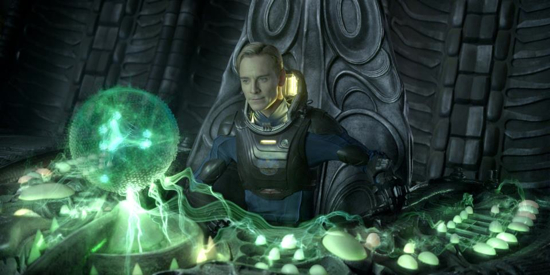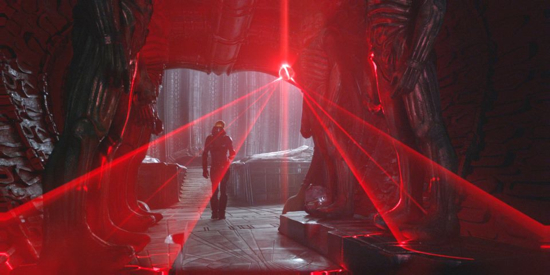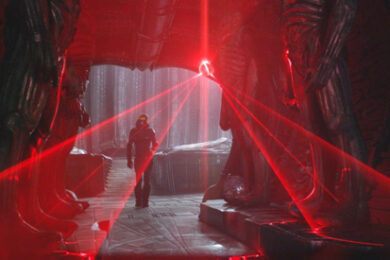There’s no possible way a film could be made that would live up to the anticipation and general giddiness surrounding the release of Prometheus – Ridley Scott directing some sort of massive blockbuster tenuously affiliated to the Alien franchise, just to make sure keyboards flood with drool as teasers and trailers are flaunted over YouTube and muddy gossip is swapped on social media sites. So disembodied has the fervour become from the brilliantly original, stylish and adorably camp 1979 flick that the gods themselves couldn’t forge a spectacle gaudy enough deep in the womb of Mordor, or wherever it is nerds think babies come from, to meet these expectations. Unsurprisingly, it doesn’t live up to much of anything.
It all starts in the year 2089 when archaeologist Elizabeth Shaw (Noomi Rapace) and a bunch of scientists find a cave painting in Skye. Well, they say they’re scientists. As it turns out, in the future, rather than becoming more vigorous in their methods and analysis, scientists have become remarkably waffly and sloppy. These ancient diagrams depict the same constellation. The team deduce that this is a message from super beings who created the human race and will provide the answers to such bourgeois questions as why we’re here and, most sickeningly of all, why they abandoned us. People’s expectations of science have become so low that a company will pay a trillion dollars to go on a mission to the other side of space based solely on childish whimsy. Probably because we were impossibly dull and spent our time asking ridiculous questions.
When asked why she believes these as yet undiscovered creatures gave us life (a claim completely unsupported by any other evidence), Shaw replies, "Because I choose to believe." She also refuses to allow weapons to accompany their initial research trip to the lair of these unknown aliens because it’s "a scientific expedition". Yeah, well, guess what happens? They need the guns after all. Prometheus is supposed to be a sci-fi thriller, yet all the tension is contrived by these tropes of a terrible horror film. Since you can see what comes next a mile off, the jumps are entirely reliant on the goriness of the inevitable mauling, rather than a well-worked build up.
As with Alien, a crew has been assembled and they all come out of stasis. This time they’re woken by a wonderfully, sinisterly tidy Michael Fassbender, who plays the ship’s movie-obsessed monotone android David: a cross between Kryten from Red Dwarf and Patrick Bateman. What has always bothered me about Alien is that it started a trend in cinema that said a carefully selected crew of engineers and scientists for a highly sensitive mission could in fact be a bunch of loutish idlers. Prometheus is characterised by a psychotic geologist who looks like he’s escaped a prison ship and inexplicably has ‘Poo’ tattooed on his forehead.
Among all the niggles, the main problem with Prometheus is that it starts out far too ambitiously and very little gets resolved. Meredith Vickers (Charlize Theron) is introduced like a vampiric spanner in the works whose hidden agenda will compromise the apparently scientific mission. That comes to absolutely nothing, and by the end she’s merely a bit unlikable and needlessly disruptive. Peter Weyland (Guy Pearce), the phenomenally ancient man who funded the mission, dramatically reappears then fizzles out awkwardly. The opening sequence of a chap swallowing some sort of liquid never gets explained properly. Why did he swallow it? To what end? What is it? Then Noomi Rapace gives birth to the offspring of her partner who has become infected by some alien spore, but that’s all glossed over. Surely there’s some major Rosemary’s Baby material in there somewhere? In parts it’s like watching Saturday morning kids’ TV: This is happening, now this is happening, now this, look over here – quick!
Then there’s the penis problem. When a movie turns into a parade of genitals, I usually put it down to severe guilt induced by an early exposure to Sunday school and close my eyes till it passes. Yet even after much squinting and eye rubbing, Prometheus became a 3D penis whirlwind. Most of it must have been done on purpose for a joke. There really is no other explanation. One can only imagine the conversation about creating the first alien life form we encounter. "I like the shape, but can we make the head slightly more bulbous? Yep, that’s great, but still missing something. Oh, can we put a slit down the tip of the head? Much better. Also, every time one of these ‘aliens’ is introduced on screen, it has to eventually be jammed down the throat of one of the men. Perfect."

Right near the end, it gets really messy. A large vaginal beast straddles a door sucking in its prey before launching one of these swollen probes down the throat of an unsuspecting creature (who’s probably trying not to giggle). After the probe has been inserted, the ravenous beast collapses on top of its prey with a distinct floppy lull and satisfied exhalation. I know that move! So what is supposed to be terrifying is deflated to titillation.
Then there’s the ending. Is nobody else bored with this relentlessly tedious climax that’s been slapped on the end of every recent big budget action film? After a bunch of fighting, the final massive baddie sets off to blow up the entire world and destroy all life, but fails after about five minutes of trying. Every single blockbuster, the same ending, every time. In Avengers Assemble it’s the massive ship from the sky; in Wrath Of The Titans it’s Kronos. Battleship has the last big ship; even Iron Sky had the big Nazi ship. It’s so final and so much more abstract than, say, Ripley’s final battle at the end of Alien. A woman’s life in severe terror is much easier to comprehend than the annihilation of all life, including the seat you’re sat in, which is so final it becomes meaningless in terms of dramatic impact.
It’s worth stating that there is much to praise about Prometheus. All the main cast are superb and give incredible performances. It is visually stunning. The alien planet is a remarkable construction of natural scenery and inventive architecture – fans of Ridley Scott’s detailed and original sets will not be disappointed. Overall, however, this is too thoughtful to be a silly blockbuster, yet too flawed to become the classic that was so hoped for. Freudians will love it though.



